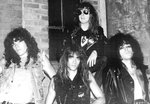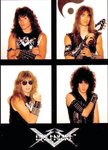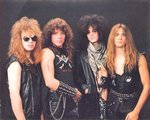


During the 1980s, Ded Engine was a fierce driving force in not only the Lansing heavy metal scene, but across oceans, as well. Hell, the band even got to pal around a bit with Iron Maiden during 1982’s “Number of the Beast” Tour.
Ded Engine, which comprised Doug Horstman (lead guitar), G. H. Lorimer (drums), Scott Litz (vocals) and Marky De Sade (bass), issued two proper full-lengths in its lifespan: a self-titled 1985 LP and 1988’s “Hold a Grudge.” While the band would gig at area spots like Rick’s, the Marshall Street Armory and the Lansing Civic Center, each of their records steadily garnered more international acclaim. And it wasn’t just here in the United States: metal publications across the globe took notice.
One of those old press clippings, a May 1988 band interview with Kerrang! Magazine, includes a lengthy chat with the foursome, even digging back to the band’s 1981 genesis. British rock writer Ray Zell questioned why the band named itself Ded Engine when, sonically, they were a “power overload.”
“Yeah, I guess it does sound like a contradiction, but then it is meant to be somewhat tongue-in-cheek,” Horstman explained. “It’s got the humor aspect — like Def Leppard and Led Zeppelin, you know? We had a lot of ideas, but Ded Engine just sounded right. It sounds powerful. But there’s no great story behind it or anything. It’s no big thing.”
Horstman also went on record regarding the Lansing band’s many comparisons to metal pioneers Judas Priest. “Sure, it’s a compliment, but I think a lot of people look at Priest for their past music,” he said at the time. “I don’t think there’s a comparison to what they’re doing now. We’re not a Judas Priest copy-band. Ded Engine has its own sound.”
That interview was during a press blitz for “Hold a Grudge,” and DeSade was quick to mention how the polished album was financed in a DIY manner.
“We put up the money … $5,000,” DeSade told Kerrang. “We wanted to do the record by ourselves because we had so many problems with management hassles and shit between the last LP and this.”
Today, the Ded Engine discography has a lingering cult following, starting with 1983’s “Limited Edition EP.” The scorching three-track debut, released on cassette by Genocide Records, was a lo-fi demo cut for $300, but promptly caused a buzz in the metal underground.
From there, in early 1984, the local boys were included on “It's Unheard Of!,” a now-collectible British compilation LP that made an exception to include the Michiganders in Ded Engine.
Later that year, in 1984, came the “Two Bad” 7-inch. A limited run of 1,000 copies were Issued by Genocide Records and were sold at indie shops like Flat, Black and Circular, but also at big chain outlets like Recordland, Wherehouse Records, and Musicland. The band’s fan club allowed for some mail order, as well.
In 1985, Ded Engine’s breakout year, the outfit issued its second cassette-only EP, “Till Deaf Do Us Part.” Once again on Genocide Records, the release had new tracks like the title track and “Hot Shot,” but also a new take of “Reign of Terror,” from the first EP.
The self-titled record, also pressed in 1985, hit stores across the globe after critical praise circulated in mainstream metal mags like Circus, Hard Rock and Metal Edge. Music stores fought to keep up with customer demand.
Ded Engine then hit the road and toured parts of the country while scoring national airplay along the way. In December, the group appeared on “Secrets of Surviving,” an NBC television special. According to DedEngine.com, the show featured Bill Cosby and addressed a few common teenager problems — including the “moral hemlock” of heavy metal. Obviously, Ded Engine was featured as defenders of metal. Also on the program was fellow head-bangers, Twisted Sister.
“Hold a Grudge,” the last LP, was released and promoted from 1987-88, in LP, cassette, and (for the first time) CD formats. The album was released via Grudge Records, an American label formed by former CBS Records employees. But, for some reason, it proved to be their last gasp on wax.
However, after its 1988 release, Horstman and his mates still seemed optimistic about their future.
“As I said earlier, Ded Engine has its own sound, and as long as we can go in the studio and have total control, we’ll capture the power and energy and achieve the results we were looking for whether it cost us $5,000 or $50,000 … although, I wouldn’t mind a couple of million for the next one!”
While their entire discography stands the test of time, according to that 1988 interview, Horstman said (in short) that you had to be there. “As for the album and our live sound — live we’re more energetic. We’re much better live,” he admitted.
Luckily, YouTube has stellar vintage Lansing Civic Center footage and a rare interview with the late Marky DeSade, who passed away in 1994. Since Ded Engine’s breakup, Michigan has built a massive metal community. But, back in the ’80s, DeSade told the British press it was nothing to brag about.
“We have a problem, in Michigan especially,” DeSade scoffed. “The powers that be don’t like anything to do with heavy metal. We’re very restricted. Many local bars don’t encourage bands with original material. It’s all wimp shit.”
Luckily, since then … times have changed. Visit dedengine.com for all things Ded Engine.
1 comment on this item Please log in to comment by clicking here
Support City Pulse - Donate Today!
maskimummu
I remember them. Thanks for the article.
Thursday, September 2, 2021 Report this